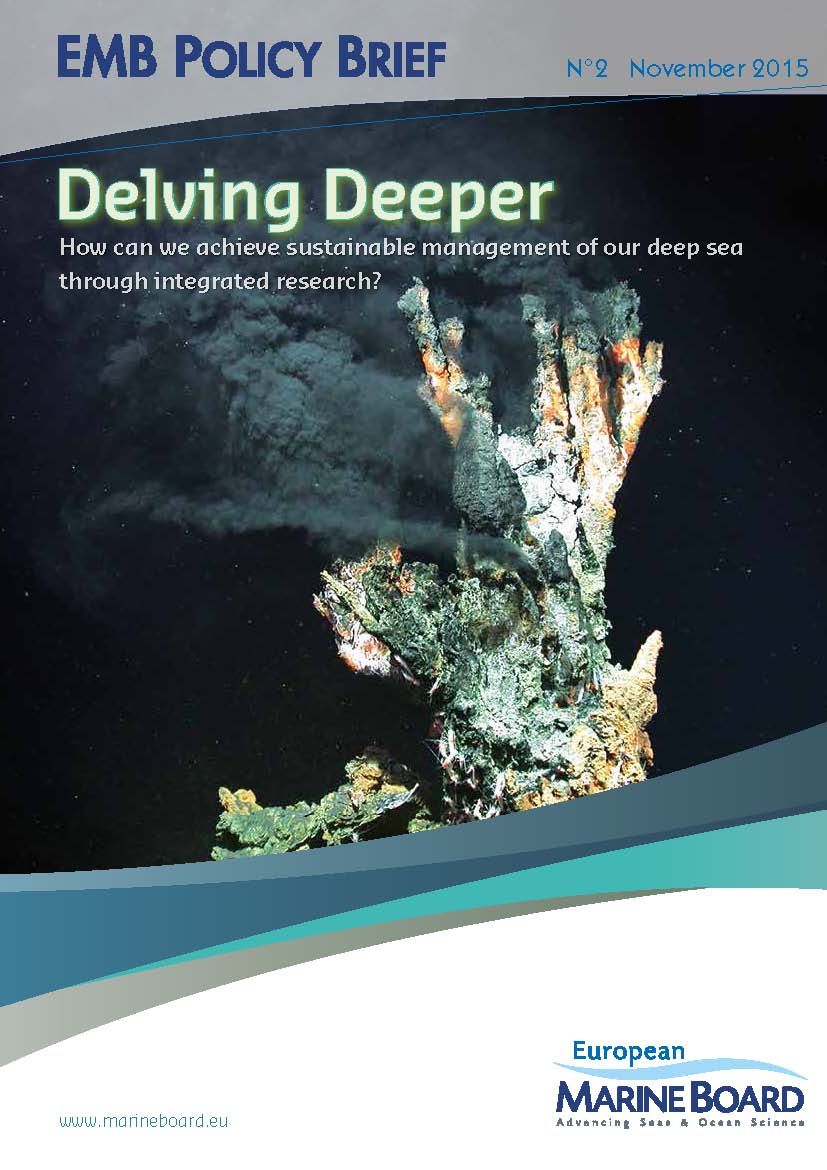Outputs
Policy Brief 2, Delving Deeper: How can we achieve sustainable management of our deep sea through integrated research? (November 2015)
Brief 2, Delving Deeper: How can we achieve sustainable management of our deep sea through integrated research? (November 2015)
Positi on Paper 22, Delving Deeper: Critical challenges for 21st century deep sea research (September 2015)
on Paper 22, Delving Deeper: Critical challenges for 21st century deep sea research (September 2015)
News release for the deep sea publication (September 2015)
EMB Science Webinar on Critical research needs for informing environmental management of deep-sea mining (May 2022)
EMB Science Webinar on Are we delving any deeper? (October 2021)
Background
 The deep sea comprises the major habitable volume of Planet Earth. It holds a substantial repository of the biological diversity and geological resources on the planet. Deep-sea environments provide us with important goods and services that range from direct provisioning such as fish, chemical compounds for industrial and pharmaceutical uses, and mineral resources, to less directly identifiable services such as regulation of global biogeochemical cycles and nutrient cycling, which are crucial to the functioning of our planetary system. However, its 3D complexity, immense size and remoteness, coupled with the still relatively small effort in scientific research, means that the deep sea ecosystem remains poorly understood.
The deep sea comprises the major habitable volume of Planet Earth. It holds a substantial repository of the biological diversity and geological resources on the planet. Deep-sea environments provide us with important goods and services that range from direct provisioning such as fish, chemical compounds for industrial and pharmaceutical uses, and mineral resources, to less directly identifiable services such as regulation of global biogeochemical cycles and nutrient cycling, which are crucial to the functioning of our planetary system. However, its 3D complexity, immense size and remoteness, coupled with the still relatively small effort in scientific research, means that the deep sea ecosystem remains poorly understood.
We identified a strong need for a powerful vision based on an ecosystem approach, coupled with the precautionary approach, to support the goal of sustainable development and ocean health in the deep sea. Moreover, Europe should position itself as a front-runner in matching economic opportunities with best science and governance associated with the emerging exploitation of biological and mineral resources from the deep ocean, and other expected activities such as CO2 sequestration and deposition.
Objectives
- Enhance cross-sector, interdisciplinary dialogue and provide a platform for future partnerships on deep-sea activities between the scientific, industry and socio-economic communities.
- Assess recent achievements in deep-sea research, current infrastructure and research capabilities and identify gaps and priorities (thematic and geographical) for future European research efforts (in the context of international efforts).
- Define key societal opportunities in the deep-sea e.g. mining, biological resource extraction, CO2 sequestration etc. and how deep-sea research can inform these activities with expert knowledge.
- Define key recommendations for future European deep-sea research that can address societal challenges and opportunities and can be taken up by policy makers to inform future research agendas at the European and national levels.
- Propose mechanisms for how deep-sea research can contribute timely, informative knowledge to the policy making process to inform ocean stewardship and governance.
- Provide rules and guidance for the application of ecosystem-based approaches towards ecological sustainability of the deep sea, with evaluation of impact assessment needs.
Related activities
- EMB Policy Brief launch – The Policy Brief on the deep sea was launched at a European Commission event on the Oceans of Tomorrow in November 2015 in Brussels.
- EMB Position Paper launch - The Position Paper on the deep sea was launched at an official side-event of the International Deep-Sea Biology Symposium 2015 on September 1 in Aveiro, Portugal. Please see the website for the programme.
- EMB stakeholder consultation on deep sea investment – In 2014 EMB ran a consultation on European and National investment in deep-sea research. We received 103 responses in total from 16 countries (14 European, 2 International). These included 83 from the marine research community (80 from individual researchers; 3 funding organizations) and 20 from industry.
- EMB WG Deep Seas Chair presented draft recommendations at EurOCEAN 2014 - On 8 October 2014, WG Chair Prof. Alex Rogers presented at EurOCEAN 2014 on the subject 'What the blue growth agenda means for deep sea research'. This included reference to current work and recommendations from our foresight activities, including a summary of the deep-sea investment study conducted in summer 2014.
- European Commission (DG MARE) Consultation on Seabed Mining (2014). EMB response
Meetings
- 14-15 January 2014, Brussels, Belgium
- 24-25 April, 2014, Oxford, UK (plus external stakeholder event 1)
- 13-14 November 2014, Lisbon, Portugal (plus external stakeholder event 2)
 Members
Members
Chair: Alex Rogers, University of Oxford, UK
Working Group members:
Antje Boetius, Alfred Wegener Institute, Helmholtz Centre for Polar and Marine Research (AWI), Germany
Andy Brierley, University of St. Andrews, UK
Peter Croot, National University of Ireland, Galway, Ireland
Marina Cunha, University of Aveiro, Portugal
Roberto Danavaro, Polythecnic University of Marche, Italy
Colin Devey, GEOMAR Helmholtz Centre for Ocean Research Kiel, Germany
Andre Freiwald, Senckenberg Institute, Germany (withdrew membership October 2014)
Alf Haakon Hoel, Institute of Marine Research (IMR), Norway
Henry Ruhl, National Oceanography Institute (NOC), UK
Pierre-Marie Sarradin, French Research Institute for Exploration of the Sea (Ifremer), France
Seline Trevisanut, University of Utrecht, Netherlands
Helena Vieira, University of Lisbon - formerly at Bioalvo (SME), Portugal
Martin Visbeck, GEOMAR Helmholtz Centre for Ocean Research Kiel, Germany
Sybille van den Hove, MEDIAN SCP (SME), Spain
Contact at European Marine Board Secretariat: Email